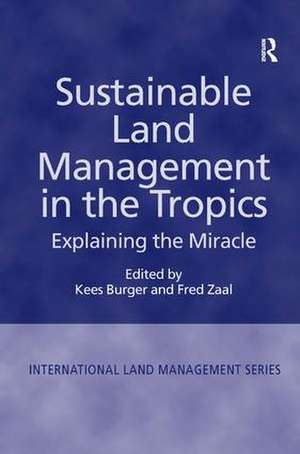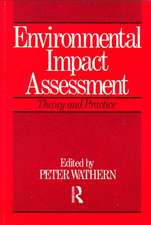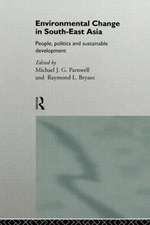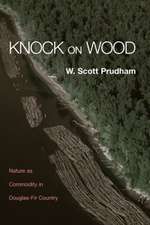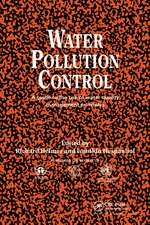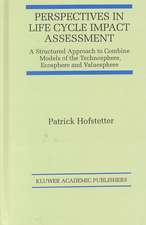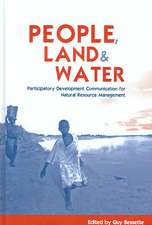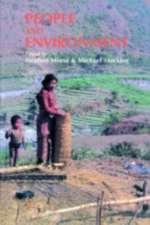Sustainable Land Management in the Tropics: Explaining the Miracle
Autor Fred Zaal Editat de Kees Burgeren Limba Engleză Hardback – 28 mar 2009
| Toate formatele și edițiile | Preț | Express |
|---|---|---|
| Paperback (1) | 323.23 lei 6-8 săpt. | |
| Taylor & Francis – 15 noi 2016 | 323.23 lei 6-8 săpt. | |
| Hardback (1) | 699.83 lei 6-8 săpt. | |
| Taylor & Francis – 28 mar 2009 | 699.83 lei 6-8 săpt. |
Preț: 699.83 lei
Preț vechi: 823.33 lei
-15% Nou
Puncte Express: 1050
Preț estimativ în valută:
133.93€ • 139.31$ • 110.57£
133.93€ • 139.31$ • 110.57£
Carte tipărită la comandă
Livrare economică 15-29 aprilie
Preluare comenzi: 021 569.72.76
Specificații
ISBN-13: 9780754644552
ISBN-10: 0754644553
Pagini: 226
Dimensiuni: 156 x 234 x 14 mm
Greutate: 0.5 kg
Ediția:1
Editura: Taylor & Francis
Colecția Routledge
Locul publicării:Oxford, United Kingdom
ISBN-10: 0754644553
Pagini: 226
Dimensiuni: 156 x 234 x 14 mm
Greutate: 0.5 kg
Ediția:1
Editura: Taylor & Francis
Colecția Routledge
Locul publicării:Oxford, United Kingdom
Cuprins
Contents: Preface; Optimistic determinism or explaining a miracle, Ton Dietz with Jan Willem Gunning, Andries Klaasse Bos and Adri Zuiderwijk; Beyond population growth: intensification and conservation in dryland small-scale agriculture: Machakos and Kitui districts, Kenya, Fred Zaal and Remco H. Oostendorp; Farm- and household-level drivers of agricultural innovation in Machakos and Kitui districts, Kenya, Remco Oostendorp and Fred Zaal; Impact of transaction costs and risks on terracing in Kenya, Samuel M. Mwakubo, Michael K. Bowen, Wilson K. Yabann and Henry K. Maritim; The productivity of indigenous soil and water conservation in Benin, Esaïe Gandonou and Remco Oostendorp; More market, less poverty, less erosion? The case of Benin, Esaïe Gandonou and Kees Burger; Agricultural intensification in the Koza plain drylands, Cameroon: ongoing trends and possible futures, Wouter T. de Groot and Adri B. Zuiderwijk; Forest fringe farmers on the way to sustainability: an econometric and cost-benefit analysis, Wouter T. de Groot and Marino R. Romero; Transition as induced innovation, Kees Burger; Lessons on land management, Fred Zaal and Kees Burger; References; Index.
Notă biografică
Dr Kees Burger, Department of Development Economics, Wageningen University, The Netherlands and Dr Fred Zaal, Faculty of Social and Behavioural Sciences, University of Amsterdam, The Netherlands
Recenzii
'This volume analyses and follows up the impact on the population environment debate made by More People, Less Erosion, 1994, a study of sixty years of environmental and social change in Machakos, Kenya. Including a detailed farm-based questionnaire and a careful mathematical analysis of four countries this book confirms that given a road to market and some land scarcity, farmers can find means to protect the soils. It is a finding that bears repeating.' Mary Tiffen, formerly of the Overseas Development Institute, London 'Sustainable Land Management in the Tropics is a timely addition to Ashgate's International Land Management Series...the book provides well-considered and engaging fodder for anti-Malthusians and related discourses on people-environment relationships.' Singapore Journal of Tropical Geography 'This book makes an enlightening contribution to the population-environment debate.' International Journal of Environment and Pollution
Descriere
Bringing together case studies from Kenya, Benin, Cameroon and the Philippines, this volume provides a multidisciplinary overview of the economics of natural resource management in Tropical regions, at household and village level. By comparing a wide array of climatic and economic conditions, it examines the effect of location and access to the market - as well as the importance of national policies - have on soil and water conservation.
